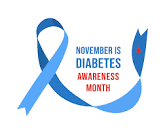RCMS News and Events
|
Stay Connected with RCMS
Scroll down to see the latest updates and click the button below to subscribe to The Pulse to get regular updates from RCMS directly to your email inbox. |
|
Stay Connected with RCMS
Scroll down to see the latest updates and click the button below to subscribe to The Pulse to get regular updates from RCMS directly to your email inbox. |
 November is National Diabetes Month, a time when communities across the country seek to bring attention to diabetes. This year’s focus is on taking action to prevent diabetes health problems. Diabetes is a disease that occurs when your blood glucose, also called blood sugar, is too high. It affects about 37 million Americans, including adults and youth. Diabetes can damage the eyes, kidneys, nerves, and heart, and it is linked to some types of cancer. But there’s also good news: Taking charge of your health may help you prevent diabetes health problems. Tips to get started Manage your blood glucose, blood pressure, and cholesterol levels. Research shows that managing your diabetes as soon as possible after diagnosis may help prevent diabetes health problems. You can start by managing your diabetes ABCs.
Take small steps toward healthy habits. Lifestyle habits such as planning healthy meals, being physically active, getting enough sleep, and not smoking may help you manage your diabetes ABCs. You don’t have to do it all at once. Start slow and build healthier habits from there. Take your medicines on time. Remember to take your medicines even if you feel healthy. Talk with your doctor or pharmacist if you have trouble taking your medicines on time or at the correct dose. Reach or maintain a healthy weight. If you have overweight or obesity, ask your primary care provider if healthy eating, physical activity, or other weight-loss treatments may help you manage your weight. Take care of your mental health. Managing diabetes can be hard. If you feel down, sad, or overwhelmed, learn about healthy wasy to cope with stress. Consider talking to a mental health counselor or joining a support group. Work with your health care team. Managing diabetes takes a team. Your health care team may include a primary care provider, diabetes specialist, registered dietitian, or certified diabetes educator. Ask your primary care provider if you should talk with other health care professionals about your diabetes. Diabetes medicines, devices, and office visits can be expensive. A social worker or a member of your health care team may be able to help you find community resources or financial help for diabetes care. For more information please visit the National Institute of Diabetes and Digestive and Kidney Disease. Comments are closed.
|
News & EventsLatest news and information on upcoming events at RCMS Archives
July 2024
Categories |